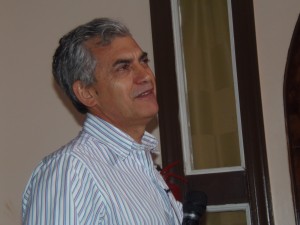
Cooperation is key in combating the Citrus Greening disease or the Huanglongbing (HLB) which has negatively affected the citrus sector in the region, a researcher from Brazil has advised.
Researcher from Fundecitrus in Brazil, Silvio Lopes told reporters on Wednesday at the start of a three-day technical workshop in Dominica on the management of Citrus Greening or Huanglongbing (HLB) in the Caribbean, that, as one of the largest exporters of orange juice, Brazil has learnt to deal with HLB.
“I am from Brazil and citrus in Brazil is a very important crop; we produce most of the orange juice that is consumed in the world,” he said. “And HLB has been around since 2004 and it is causing a lot of difficulties to our growers and to our government and to the economy but we have learnt how to work with this disease.”
According to him, Brazil has lost millions of trees but they are still doing well.
“Despite the large number of trees that was removed because of this disease, we still are producing the same amount of fruit as before 2004. But at the same time it has caused million trees so far, but we are doing well,” Lopes said.
He said Brazil is bringing its experience on how it deals with HLB to the Caribbean.
“And what we think we can contribute here is with our experience with this disease now 10 years now and we learned a lot with research and with the experience of the grower now we know we can control this disease. It’s not easy but we can, and the main message is if any country really wants to control the disease, they can do it.”
He explained that the farmers in his country work together.
“The farmers cooperate very well because removing one tree or another tree is not a big problem, but the problem starts when the incidents of the disease start increasing too much and you need to remove the affected trees in order to remove the source of contamination,” he said.
‘But the grower needs to learn one thing, which is very, very important. Alone he will not be able to control this disease, he needs to work together. He needs to review his feeling with his neighbor and start working together. Because the insect which will disseminate the cause of the disease which is a bacterium, will not respect any fence, so if they work together in a large area, then everything will be easy for everybody,” Lopez added.
Meantime Jamaica has also partnered with the Food and Agriculture Organization (FAO) for a two year technical intervention, Principal Research Director in the Ministry of Agriculture and Fisheries in Jamaica Lisa Myers Morgan explained.
According to her they made a request which received a timely response to deal with this HLB in Jamaica.
“When our farmers were introduced to this program, and we engaged them, initially there was a lot of concern because of what it is that they are going to achieve or obtain as a result of these interventions. They were concerned about the cost associated with the interventions, but what we realize was that they could not participate with the individual farmers, they had to participate collectively as a group,” she said.
She said that although this intervention is about three years old, there hasn’t been much of a significant difference in yield. “The trees are still being productive however there are still changes in the fruit size which could affect processing and they are not as sweet as they used to be originally, so they while the affected trees can remain productive they must be removed and replaced,” Morgan said.

If the farmers work TOGETHER…. This can work out very well.
So now the ministry of agriculture now have to work directly with the farmers on this one. But then again they also had to work directly with the farmers for the control of the Black Sigatoka disease and we all know how that went. St. Lucia has exported 5,000 tonnes of banana this year already, Grenada is also doing well agriculturally but Dominica just can’t seem to get off the ground even though St. Lucia and Grenada have been hit by major hurricanes and Black Sigatoka in which we only were affected by the latter.
I wanna see how this plays out.